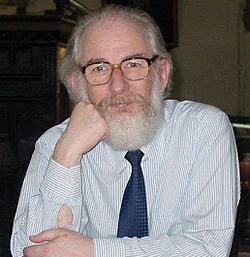John Holt quotes about learning
American Educator April 14, 1923 – September 14, 1985
Cite this Page: CitationQuotes
We destroy the love of learning in children, which is so strong when they are small, by encouraging and compelling them to work for petty and contemptible rewards, gold stars, or papers marked 100 and tacked to the wall, or A's on report cards, or honor rolls, or dean's lists, or Phi Beta Kappa keys, in short, for the ignoble satisfaction of feeling that they are better than someone else.
John Holt
Over the years, I have noticed that the child who learns quickly is adventurous. She's ready to run risks. She approaches life with arms outspread. She wants to take it all in. She still has the desire of the very young child to make sense out of things. She's not concerned with concealing her ignorance or protecting herself. She's ready to expose herself to disappointment and defeat. She has a certain confidence. She expects to make sense out of things sooner or later. She has a kind...
John Holt
A child whose life is full of the threat and fear of punishment is locked into babyhood. There is no way for him to grow up, to learn to take responsibility for his life and acts. Most important of all, we should not assume that having to yield to the threat of our superior force is good for the child's character. It is never good for anyone's character.
John Holt
This idea that children won't learn without outside rewards and penalties, or in the debased jargon of the behaviorists, "positive and negative reinforcements," usually becomes a self-fulfilling prophecy. If we treat children long enough as if that were true, they will come to believe it is true. So many people have said to me, "If we didn't make children do things, they wouldn't do anything." Even worse, they say, "If I weren't made to do things, I wouldn't do anything."It is the creed of a...
John Holt
Of all I saw and learned this past half year, one thing stands out. What goes
on in the class is not what teachers think-- certainly not what I had always
thought. For years now I have worked with a picture in mind of what my
class was like. This reality, which I felt I knew, was partly physical, partly
mental or spiritual. In other words, I thought I knew, in general, what the
students were doing, and also what they were thinking and feeling. I see now
that my picture of reality was almost...
John Holt
We who believe that children want to learn about the world, are good at it, and can be trusted to do it with very little adult coercion or interference, are probably no more than one percent of the population, if that. And we are not likely to become the majority in my lifetime. This doesn't trouble me much anymore, as long as this minority keeps on growing. My work is to help it grow.
John Holt
schools assume that children are not interested in learning and are not much good at it, that they will not learn unless made to, that they cannot learn unless shown how, and that the way to make them learn is to divide up the prescribed material into a sequence of tiny tasks to be mastered one at a time, each with it's approrpriate 'morsel' and 'shock.' And when this method doesn't work, the schools assume there is something wrong with the children -- something they must try to diagnose and...
John Holt
We can best help children learn, not by deciding what we think they should learn and thinking of ingenious ways to teach it to them, but by making the world, as far as we can, accessible to them, paying serious attention to what they do, answering their questions -- if they have any -- and helping them explore the things they are most interested in.
John Holt
Why do people take or keep their children out of school? Mostly for three reasons: they think that raising their children is their business not the government’s; they enjoy being with their children and watching and helping them learn, and don’t want to give that up to others; they want to keep them from being hurt, mentally, physically, and spiritually.
John Holt
Someone asked the other day, "Why do we go to school?" Pat, with vigorunusual in her, said, "So when we grow up we won't be stupid." Thesechildren equate stupidity with ignorance. Is this what they mean when theycall themselves stupid? Is this one of the reasons why they are so ashamed ofnot knowing something? If so, have we, perhaps un-knowingly, taught themto feel this way? We should clear up this distinction, show them that it ispossible to know very few facts, but make very good use of...
John Holt
- 1
- 2
Popular Author
Related Authors
-
AS
Anne Sullivan Macy Educator
-
BC
Benno C. Schmidt, Jr. Educator
-
BN
Bill Nye Educator
-
 David Crystal Educator
David Crystal Educator -
JD
Jeremiah Day Educator
-
JK
Joel Kotkin Educator
-
JH
John Hutton Educator
-
MP
Michael Pollan Educator
-
MS
Morrie Schwartz Educator
-
WH
William Hepworth Thompson Educator

